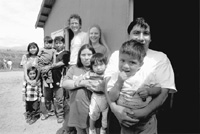Story by Clint Kelly
Photos by Jerry Gay
![]() Bob and Gracie Ekblad
(middle) have come alongside a diverse Hispanic
community underpinning the agricultural economy of Skagit County. The
Martinez family (in the foreground) and the Mereno family (in back) have
come north from Oaxaca, Mexico, in search of opportunity and a more secure
life for parents and children.
Bob and Gracie Ekblad
(middle) have come alongside a diverse Hispanic
community underpinning the agricultural economy of Skagit County. The
Martinez family (in the foreground) and the Mereno family (in back) have
come north from Oaxaca, Mexico, in search of opportunity and a more secure
life for parents and children.
![]()

 What do Bob and Gracie Ekblad have in common with the
people they have come to reach with the gospel? Not much.
What do Bob and Gracie Ekblad have in common with the
people they have come to reach with the gospel? Not much.
The Ekblads are Anglos. The migrant workers of Washington's Skagit County are largely Hispanic.
The Ekblads were city-raised and are graduates of Seattle Pacific University. The migrants are little-educated farmers, mostly from small towns and villages deep in southern Mexico.
The Ekblads are law-abiding citizens. Half the people they see on a daily basis are illegals, many of whom have paid "coyotes" or smugglers up to $1,500 to get them into the United States under the noses of the Border Patrol.
"The one thing we share with them," says Gracie, a former English literature major and mother of three, "is the same struggles and hopes for our families. Our children are a bridge to span the cultural barriers. We go out into the fields and visit with whole families harvesting cucumbers or berries. Picking alongside them, a confidence is established."
Such a bond was formed with Rocío, a young mother whose second pregnancy paralleled Gracie's third. Rocío grew up nominally Catholic, but her unsettled background left her in fear of a punishing God who wielded a big club. When Rocío moved in with the Ekblads and the two women supported each other and their newborn children, that fear began to melt. God's love took its place and now Rocío is a lay pastor who opens her home to others in search of the God who transforms.
Bob -- tall, intense, curly headed -- often finds himself in immigration court, sometimes the only "gringo" there in defense of a Mexican in leg irons. Trapped by poverty and/or drug addiction, driven by anger and feelings of helplessness and shame, the accused has come north to find a better life. What he or she finds are 12-hour days and six-day work weeks for minimum wage, followed by family breakdown and escalating feelings of failure.
"I see a lot of injustice," says Bob. Ordained Presbyterian ministers, he and Gracie earned master of divinity degrees from the theological seminary of the Reformed Church of France in Montpellier, and co-direct an ecumenical ministry to Hispanic immigrants called Tierra Nueva del Norte, "New Earth of the North."
"No one can hold a candle to these people as laborers," says Bob, who also earned a Ph.D. in Old Testament. "Yet they are often characterized by white society as coming to the United States to freeload off the welfare system, or to sell drugs. They take the jobs many white folks won't. If the 15,000-20,000 migrant workers in Skagit County were to suddenly vanish, our agriculturalists, fish and chicken processors, and restaurant owners would be in major crisis."
The Ekblads advocate for these harvesters who have no voice. Their chief focus is to train pastoral leadership in biblical studies. Still, a quarter of Bob's time is spent in the Skagit Valley Jail where he works as a chaplain. He visits with inmates one-on-one, and conducts two Bible studies each week.
In jail for often-complex reasons that range from unpaid traffic fines to dealing drugs in the hope of supplementing their low wages, the immigrants hear from Bob of a God that is not distant or unsympathetic. They hear that he is a God at work to liberate people from all bondage, whatever form it takes. It is sweet news to the ears of those who have come to expect no mercy.
The Ekblads began their ministry to migrant farm workers six years ago. It
was somewhat familiar territory. Just a week after graduating from
 Seattle Pacific in 1982, they left for six years of ministry among the
illiterate and semi-illiterate campesinos, or peasants, of Honduras.
Seattle Pacific in 1982, they left for six years of ministry among the
illiterate and semi-illiterate campesinos, or peasants, of Honduras.
Bob, a former history major, is an avid proponent of experiential learning. He has hitchhiked around Europe and lived three months in an Israeli kibbutz. It was probably in SPU Professor Rob Wall's class on "Luke and the Book of Acts" that he was introduced to the biblical account of liberation theology.
"Christian discipleship is making ourselves completely available to God, utterly reliant upon God's grace, wherever that takes us," believes Wall. "The end of the Ekblads' activism isn't socio-political-economic liberation, but Christian discipleship. Theirs is a deep and abiding commitment to Christ."
For Bob and Gracie, it is imperative to recognize evil -- as embodied in oppression in all its forms -- as something that God despises.
"We should take the greatest pleasure in alumni like these," Wall says. "They make a sometimes life-and-death difference in people's lives, yet not so much in dramatic fashion as in a quite ordinary one. They are agents of salvation."
![]()

| Please
read our
disclaimer.
Send any questions, comments or correspondence about Response to
jgilnett@spu.edu or call 206-281-2051. Copyright © 2000 University Communications, Seattle Pacific University.
Seattle Pacific University |